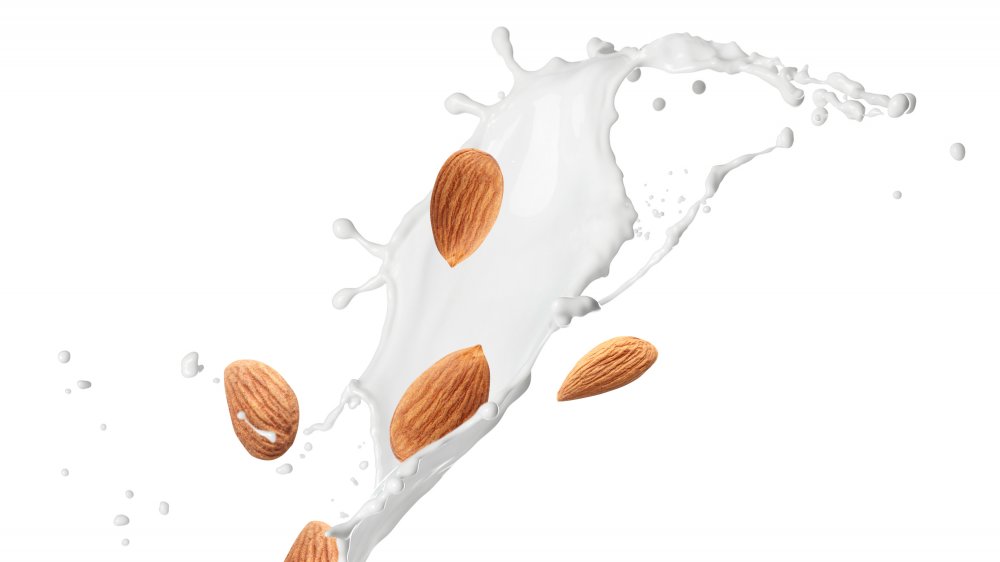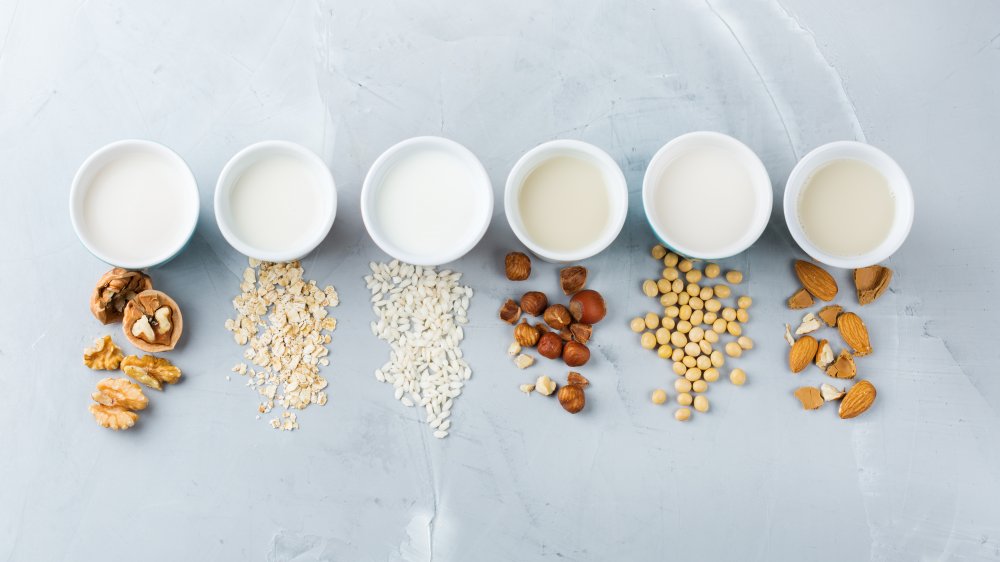When You Drink Almond Milk Every Day, This Is What Happens To Your Body
In the past decade, almond milk has enjoyed a huge growth spurt in popularity, mostly due to its strength in the millennial market (via Refinery29). It's easy to incorporate into your diet, whether it's asking for almond milk in your Starbucks drink or adding it to a smoothie. The reasons for the rise of almond milk are multifaceted. Many lactose-intolerant people use it as a milk substitute, which can translate to big numbers, especially since 65 percent of people have trouble digesting lactose, according to the National Institutes of Health.
Almond milk is a great dairy substitute for people who practice veganism, which is becoming increasingly popular (via Forbes). Plus, people just plain like how it tastes. So what happens if you incorporate almond milk into your daily diet? Don't worry — unless you're allergic to almonds, it's totally safe to drink (via PopSugar).
Almond milk can help you lose weight
Replacing your daily milk servings with almond milk can lead to some serious weight loss. A cup of unsweetened almond milk contains just 39 calories, while a cup of skim milk has 91 calories (via LiveStrong). If you usually drink 2 percent or whole milk, the difference is even greater. If you replaced a daily glass of milk with a daily glass of almond milk over a year, that would translate to saving 19,000 calories and losing roughly five pounds.
Losing five pounds over a year isn't the get-skinny-quick scheme you may have been hoping for, but it can still have a major impact on your health. According to the CDC, even losing five to 10 percent of your bodyweight can lead to improved blood pressure, cholesterol levels, and blood sugars. Plus, people who lose weight slowly are more likely to keep the weight off in the long term. Swapping cow's milk for almond milk can get you closer to your weight goals without much work.
Almond milk doesn't have much protein
While there are plenty of nutritional benefits to almond milk, there's also less than 1 gram of protein in a cup (via USDA). While that's still better than the total absence of protein in rice milk and coconut milk, it falls far short of the 8 grams provided by a cup of cow's milk (via Healthline). If you're getting plenty of protein in your diet otherwise, it doesn't matter. But if you're used to getting your daily protein intake from dairy products, almond milk isn't the way to go. Protein is crucial because it's the building block of your body, helping to repair cells and make new ones (via Medline Plus).
So why doesn't almond milk measure up in the protein department? It's all about the processing. Homemade almond milk is made from soaking almonds, blending them, and then adding them to water and draining out any remaining solids. But for commercial almond milk, the industrial process leaves the end product so watered down that it contains as little as two percent almonds, according to Business Insider. Fortunately, almond milk manufacturers make an effort to infuse almond milk with milk's other essential nutrients, including Vitamin D and calcium (via Healthline).
Almond milk can have unhealthy additives
Almond milk lacks the natural sweetness of regular milk. As a result, many brands add cane sugar to their almond milk, including Silk Original and Almond Breeze Original (via Healthy Eater). Cane sugar is chemically identical to regular sugar, and it can also lead to weight gain and promote conditions like diabetes and heart disease (via Healthline). Make sure to read the ingredients of your chosen almond milk or select unsweetened almond milk if you're avoiding sugar.
Another additive to worry about? Carrageenan, a seaweed-extract which is commonly used to thicken and emulsify processed foods (via The Kitchn). Some scientists have linked the additive to digestive issues. However, there are no animal or human studies to support that theory. Anecdotally, people have reported relief from stomach issues and migraines by removing carrageenan from their diets. Check the label on your almond milk if you're concerned, as plenty of almond milks are carrageenan free.
Almond milk is bad for the environment, which is bad for your health
Switching to almond milk might be good for your health, but it's less friendly for the health of the planet. Almonds require a huge amount of water to grow. According to Datawrapper, a single almond needs 5 liters of water to grow. Since 80 percent of American almonds are grown in California, which is already stricken by drought, that's not good news for the environment (via University of California San Francisco).
Even if you're not a tree-hugger, the effects of drought can be bad for your health. The CDC says droughts can hurt air quality, increasing the risk of wildfires and dust storms, which can irritate the lungs, worsen chronic respiratory issues, and increase the risk of bronchitis and pneumonia. If you don't have a strong preference for milk substitutes, Datawrapper suggests that soy milk and oat milk are your best bets. And at least drinkers can know, almond milk is an environmental improvement over cow's milk.




